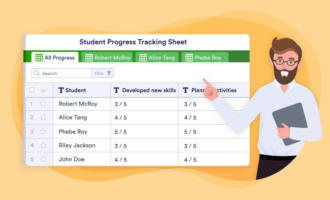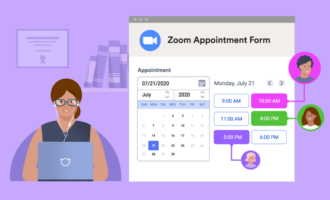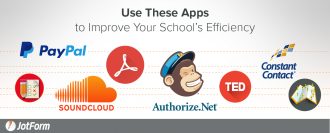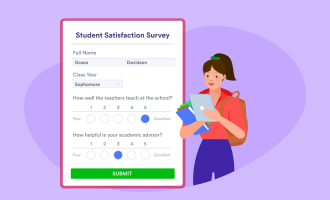What do you know about your students?
Chances are, a lot.
Today, schools collect and store massive amounts of student data that can potentially help them understand students in a way that hasn’t previously been possible. But at most schools, this data isn’t organized and available in a way that teachers can effectively use it.
Collecting the data is only half the battle. Schools must also figure out how to manage the data so that it is actually useful in facilitating improvements in student performance and teacher effectiveness.
Below are three key considerations for schools that are trying to capitalize on the wealth of information provided by student data.
Pro Tip
For an insightful look into the future of higher education, explore “8 Top Trends in Higher Education to Watch in 2024” on Jotform’s blog.
Invest in a data management system
Gone are the days when teachers, administrators, and staff could rely on lengthy spreadsheets for collecting and analyzing student data. They must now implement management systems that make data accessible so that it can be used effectively, stresses Christopher Balow, Ph.D., executive director of research and assessment at Illuminate Education, Inc.
Data management software company RingLead notes some of the key ways organizations can benefit from such a system:
- Data accessibility. Anyone with access to the system can access the data at any time. This is important for schools, as access to data is an ongoing issue for teachers. A survey of teachers and students by Data Quality Campaign showed that 26 percent of teachers still don’t have timely access to student data. When teachers and administrators can quickly access data, they can make quicker adjustments to improve learning.
- Data consistency. By keeping all of the same data in one place, data management systems help schools keep more consistent records.
- Increased productivity. Student data is meant to help teachers understand and reach students. When teachers have better access through data management systems, they can be more effective at helping their students.
But not all data management systems are created equal. When analyzing a current system or considering a new one, schools need to ask themselves a few key questions, says Andrew Redfern, product developer at Student Tracker:
- Can different teachers access the data simultaneously?
- Is the data secure?
- Is the data recorded consistently?
- Can you record all data about a student?
By implementing a system that meets all of their data management needs, schools have greater access to higher-quality data.
Pro Tip
Streamline student data management with Jotform. Collect, track, and manage student data with custom online education forms for your school.
Hire a school data manager
Technology and data can be intimidating for some teachers and administrators. This is where a school data manager comes in. Schools that increasingly depend on student data should consider hiring a data manager.
The essential role of a data manager is to keep track of and analyze all the data schools are generating. Data managers are key players in school growth, says the team at Schoolrunner, because they take the guesswork out of making changes.
With so much data being collected at schools, it can be hard for teachers to make it practically useful. Data managers help by presenting the data in a way that makes it easy for the school community to use.
Teachers are focused on teaching, as they should be, and may not have the time to crunch the data. When schools have a data manager on staff, teachers can still get the useful data they need without having to put extra time into extracting and analyzing it.

Protect student privacy
Data collection always begs the question of data protection. When schools look into long-term data management plans, those plans must include privacy protections for students.
In the 1970s, the U.S. government passed the Family Educational Rights and Privacy Act (FERPA), which gives parents the right to access their children’s education records and petition to have the records changed. They also have some control over the disclosure of personally identifiable information. These rights transfer to students when they turn 18 years old or enter a postsecondary institution at any age.
Many states have also passed student privacy laws as added protection.
But schools should be taking their own measures to protect student data. Emily Kirk, education writer for Where Learning Clicks, offers some ideas for schools to protect student privacy:
- Teach students how to protect their digital data.
- Build strong passwords and set protocols for regular password changes.
- Closely monitor networks.
- Make sure security systems, such as anti-virus software, are up to date.
- Regularly test the system’s integrity.
- Enlist a security expert to ensure defenses against cyberattacks are strong.
Amelia Vance, policy counsel for Future of Privacy Forum, argues that schools often ignore the first line of defense for student data — teachers. She laments that not enough is being done to ensure teachers have the tools and the training to keep that data safe.
Vance recommends that schools train teachers to avoid common missteps that compromise data, ensure that every teacher knows privacy laws, and educate teachers about how to keep parents informed of what student information their classrooms’ technology will use (and why).
Managing student data is not a short-term endeavor. For data to be useful, it has to be continuous, current, and relevant, which is why schools must prepare long-term data management plans. All the data in the world can’t help teachers if the data infrastructure isn’t there to support using it.






































































































Send Comment:
1 Comments:
More than a year ago
What data management software do you recommend?